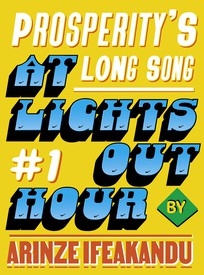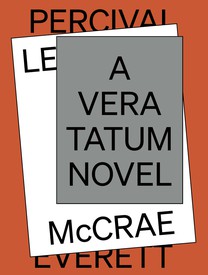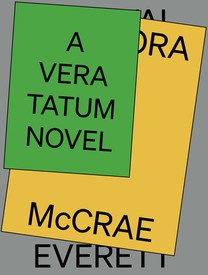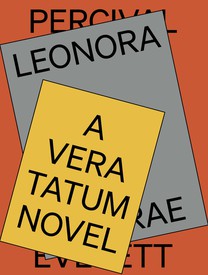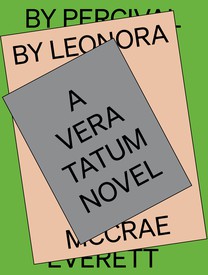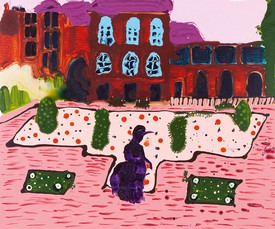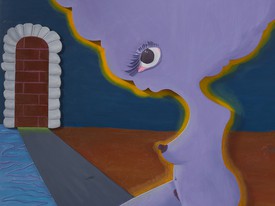
Venita Blackburn’s writing has appeared in thenewyorker.com, Harper’s, Ploughshares, McSweeney’s, the Paris Review, and other publications. The winner of the Prairie Schooner book prize in fiction for her collected stories, Black Jesus and Other Superheroes, in 2017, she is the founder of the literary nonprofit Live, Write (livewriteworkshop.com), which provides free creative-writing workshops for communities of color. Blackburn’s second collection of stories, How to Wrestle a Girl, was published in the fall of 2021. She is an assistant professor of creative writing at California State University, Fresno.
Rebecca and Sadie made an unspoken and painfully frustrating decision not to have sex until later. I don’t know which of us was more frustrated really, me, Rebecca, Sadie, or my dearest ghoul deep in the spiritual husk of Rebecca. Ugh! I imagine my ghoul lounging on a settee, dressed in a nightgown regardless of the time of day, black and white, lips and eyes darkened for the accentuating effect, a coy panda, a demure doll, surrounded by satin draped from the ceiling and walls for no practical reason other than the mystique of it all, the sex of it all. I can’t breathe. I literally can’t breathe while possessing a body; that’s just not how this works. I’m not even supposed to speak this language.
The gnashers of this town, a newborn to the twentieth century, were just like them all. They liked to be heard and not seen. The cadence of their speech was like rain hitting dry earth. They sang and cried and whispered and prayed. Pretty poems of revenge and deception flowed into each other’s ears. I learned their languages over and over, how they change with each new generation and burst forth with the same genetic knots of fury and desire. Words provide the key to every grim destiny. People draw blood from every inch of skin under the guise of honor, righteousness, insanity, God, and the devil. They spend half their lives engineering a tragedy for themselves and feel good because of words like “legal” or “justice” or “scripture.” I’m supposed to think them crude to watch and I lurk like a wolf among sheep or a butcher strolling through his racks of bacon, but the meat is a chorus to me; it howls and the words dance in my mouth. For this, I’m hated—well, for this and a lot more to be honest. The seasons were changing for Sadie and Rebecca’s people. I’ve been carried in the throats of men for so many generations that I’ve learned one thing: all can be justified. Righteousness is a learned mantra to be filled with the loot of personal desires and that desire is the judge, the god of men above all else.
I will always wait for a ghoul, a real one, not some psychotic sprite high on shrooms with a grudge against a village for cutting up her dragon-lily garden. For a goddamned ghoul I would until the sun eats this planet in a fiery death belch heard across the heavens. I would wait outside a Sephora in Santa Fe for seven hours while they tried out every fucking body cream in the store and asked so many maddening questions about retinol side effects that the clerks clawed out their eyes and ran screaming into the desert night. I would walk across the Gulf of Mexico during an oil spill while they splashed in the ink like divorcées on vacation, backstroking through the failure of mankind, the greed, the destruction, the choking off of young life. I would watch the reverie and tremble. They would glow. Shimmer. At the time, though, I could only dream. My dreams were vivid and sticky or maybe those were just Sadie’s. I was beginning to forget, and forgetting for my kind is always a warning.
The earth in that place was clay, blood and dust red as if remembering death or calling for it like a storm before harvest season. The people there wanted revenge, a tribe in crisis, one of their own, Rebecca’s own, taken for daring to be a man. The creativity of cruelty among men is second to none. The ability to forget the details over and over is second only to childbirth in women. The meter of that peculiar suffering vanishes. That morning after the crowds in the church planned and stirred their fury into the will to murder, there seemed to be that kind of forgetting in the air. Rebecca and Sadie went to their corners of the world, one in a school and the other in a bar. The day was going to be hot, but the morning defied that under fat clouds and misty shadows. The creeping things in the mud and trees stayed quiet. Windless. Chilled. I could almost sleep inside Sadie then, nudged awake by the doubts that stirred in her mind. She wondered if the fever of her lust for Rebecca ever happened or ever could have happened. Then the wondering drew her away from the bar, away from the men who drank too early or too late and tugged half-heartedly at her hips. She carried us to Rebecca, to the schoolhouse, and we watched from the trees as Rebecca’s students wandered in, a dozen children scattered in age and brilliance, mostly dim as children are. One boy had no shirt, his brown torso out to the elements. He was still too young to have the smell of men and mostly carried whatever scents of the day on him, wet leaves, smoke from his mother’s skillet and her tobacco pipe. The girls had on dresses, thin and modest, solid fabric of the summer season. Sadie considered them all too long, their futures, how they might write their names one day as men and women, become preachers or work in banks or at newspapers, telling stories of how one day they had all decided to resist the irrational torment of their neighbors and tear holes in that pocket of the earth and fill it with enemies. She thought how she might live to be proud even if she didn’t live long at all. There was a chance to do something or to do nothing and both would come with a kind of salvation. Salvation always comes with a frightening cost. The morning whispered to the town of peace, of forgetting, of blindness, of promises too. There seemed to be possibilities for many seasons like that one where fruit turned over plenty and well water stayed high. Tiny wars seemed like a place for yesterday and not tomorrow. Then Sadie and Rebecca saw each other through the doorway. Sadie had wandered closer, too close as always.
Communicating the complicated nature of possession requires some examples and there are no better examples than cinema circa 1990s, specifically serial-killer flicks and teenage rom-coms. If I had no experience in the matter I might think possession is like filleting off a woman’s skin, wearing it in the mirror like a bathing suit and humming “Girls Just Wanna Have Fun.” Almost! It changes if the skin i.e. possessed body is someone in love. Then one might think, Oh, it’s like being the Black best friend in the back seat of a Jeep convertible in Malibu, helping a white girl work out her infantile worldview on romance. Not quite. True possession is being the skin, the tremor of the song flowing over the ear, the hot asphalt where the tires meet the road, the holder of memories before they are recounted over the shoulder, the nurser of the bitterness and jealousy and selfishness that simmer in glands at the back of the throat.
Sadie left the doorway like the end of an eclipse to hide out of sight. Rebecca wrote her lesson on the blackboard, trying to steady her breath. The class laughed.
It’s all mixed and wild, Miss Rebecca, the shirtless boy said.
It ain’t mixed. It’s backwards, an older girl said, her tone serious as a bad diagnosis. Do you want us to do it like that for a purpose, Miss Rebecca?
The class became quiet, an air of embarrassment settling. Rebecca’s hand shook. She’d written or attempted to write “Jericho” on the board, but the letters were indeed reversed. The ghoul made an oopsie. There are signs that indicate the presence of another against a person’s soul, and mirrored writing is certainly one of them, but the most disturbing evidence of course comes from those who have sight. There are people who can see us without trying, without theatrical conjuring of spirits, which is usually just a total fraud and a half. But those with actual sight, access between the corporeal and the noncorporeal, do exist, and they cause a lot of fucking problems. The little boy, shirtless and reeking of nature and parental affection, stared at Rebecca in a way unlike the others. The eyes and the focus went beyond her face much deeper, and even I then, lethargic and warm, could tell he knew. He could see my ghoul. We have a few options in those cases: go to sleep, go homicidal, or go away.
Sadie drifted us back to the doorway. I like to think my ghoul could sense my distress, and it wasn’t just the attraction between the women. Somewhere, I mattered where I usually did not; usually, to be seen was nearly a violation of the purpose of my very being. The children were dismissed to go eat, unceremoniously, and like children of that time, often whipped for the mildest infraction, they obeyed. The public school lunchroom had not yet been invented, a nest for dysfunction such that even my kind dared not linger. Rebecca still had wet tired eyes from restless sleep and the sallowness that a ghoul tends to carve into a body, but she seemed lighter than I remembered. I almost didn’t recognize her, and that Rebecca seemed familiar to Sadie, who stood closer than necessary to simply say hello and ultimately said nothing at all.
They want me to speak tomorrow, Rebecca said.
Speak to who about what?
Jim. They want me to describe how I found him killed.
God, why.
As with a double shot of espresso at two in the afternoon, I was suddenly wide awake. The urgency of these people in this town to pick at a wound not yet scabbed over fascinated me. We were all awake.
You know how they are. They want a reason to fight even if it doesn’t make any sense.
They take it all whatever we make, whatever we earn. We can’t have anything here. Not even time to mourn.
Rebecca arched her back into the exhaustion of new widowhood. She was too young to have much experience with anything, certainly not the mismanagement of grief. Sadie held Rebecca by the forearm and I could feel the sensation of earnest comfort and something more selfish and even more sincere. Rebecca softened under the pressure until Sadie leaned her head onto Rebecca’s collarbone and it was enough to happily drown my ghoul and me, press us out of their bodies like popped pimples, but oh Rebecca with her shame and her dominance and her ancient tether to feminine madness knew just how to fuck up a love story.
I’ll tell them how I cared for him, Rebecca said unsexily.
What? Sadie replied, too horny to function.
Then I’ll tell them what I’ll miss before I describe the body, Rebecca continued like the buzz-kill maniac she was.
What are you talking about? Sadie asked, beginning to realize something was seriously off about the conversation.
My husband, Rebecca answered, mentioning just the wrong thing in a potential groping-sesh with a woman.
Chef’s kiss! Ugh, Rebecca dared to siphon jealousy from Sadie on behalf of a corpse, one mangled like a deer sacrificed to the altar of mankind’s stupidity. By human standards, Rebecca had the one thing that always attracts lovers: crazy. Oh, I’ve followed her kind across the whole of occupied earth from Naples to the Caribbean, no matter what it is there. Crazy and sex just match up like the dots on a domino, hypnotic and perfectly designed. The heaviness returned, my ghoul was fed again. Rebecca went from feather to brick in two minutes. I didn’t care if I was discovered fully anymore, trapped by the stares of that sighted boy and accosted by the light of a fixed gaze. Why go spend hours ransacking some poor woman’s kitchen just to get a whiff of torment when Rebecca delivered emotional chaos like a concerto? My heart, if I had one, sang. With Sadie struggling between lust and terror, Rebecca turned silent, and they leaned onto one another for a while before parting in silence. The space between them, between us all, thick as the membrane around an eye. Like an eye held open to the air for murderous seconds, I felt exposed and tortured. So good.
That afternoon and early evening I listened to the town through Sadie, a garbled mash of the people’s voices and traumas. They spoke in their tongue of leaving that bit of earth, closing the school, the bank, the church, packing it all in a box like a suit of clothes and going west. They spoke of dry air and promise, but I heard their fear and anger and how the past has shown them blood again and again, so how could the future anywhere in that bitter world be different. Still, they spoke of the possibility of life in that place, despite the frustration of having any light they produced dimmed by other men who thought like they did, who feared death like they did but were choked to insanity by pride.
Night draped a curtain around the town as the church bells rang for the meeting. Rebecca agreed to speak, sat up front on the hard wooden pew patiently waiting for all to gather. Sadie couldn’t sit so close to the altar of God given her past and present. The women would’ve pecked her with their glances to the point of bleeding. We sat separate and somehow together. Rebecca glanced over her shoulder every so often, which was very often, to see Sadie and me looking right back, gaze unchanged, unable to look away even for a brief moment of relief from longing and with each look back Sadie hummed from inside like a struck bell, a metallic and wavy feeling. Most of the congregation had gathered while the leaders arranged themselves near the altar. They wanted peace. They wanted terror. They wanted revenge. It was a tight building that could fit sixty comfortably and a hundred with distress. Distress was the event of the hour. Sadie looked back at Rebecca, thinking it one last time before there were too many eyes facing forward to justify turning around, but instead of Sadie, Rebecca found the torso of a woman smelling of pipe tobacco and okra.
Excuse me, Miss Rebecca, but my Julius didn’t come home.
Since when?
Since he left for your school. All day really. The other children are home. I checked them. It’s just mine.
Rebecca stood up and met the woman eye to eye, an ancient knowing between them. The drum of death among the melody of worry and hope. If I counseled people, I’d always advise against hope. It’s a scam. No one would listen. Rebecca told the men she would not speak. They had to look for the child now. They had to look early, not days later the way they did for her husband. They obeyed. The men and several women beat their shoes against the ground throughout the night in search of the boy. They hoped to find him lost but whole, maybe somewhat overhungry but safe. They hoped the things their neighbors had done before would stay hidden and unsaid, a memory that would rot in the brains of the dead and never be revisited. They hoped if they didn’t name the horror aloud, nothing would be true, but I hear it, in the oldest tongue, in the sweat and the fever of the body. Sadie and Rebecca took oil lanterns onto the dirt road and into the woods; their lights moving quickly and gently apart.
Text © Venita Blackburn
Read “Memoirs of a Poltergeist: Part 1,” “Memoirs of a Poltergeist: Part 3,” and “Memoirs of a Poltergeist: Part 4”
